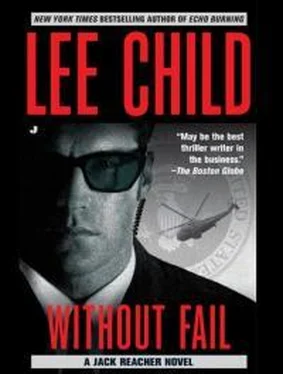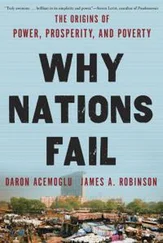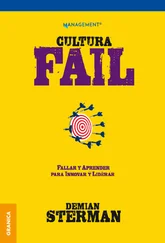Ли Чайлд - Without Fail
Здесь есть возможность читать онлайн «Ли Чайлд - Without Fail» весь текст электронной книги совершенно бесплатно (целиком полную версию без сокращений). В некоторых случаях можно слушать аудио, скачать через торрент в формате fb2 и присутствует краткое содержание. Жанр: Крутой детектив, Триллер, на английском языке. Описание произведения, (предисловие) а так же отзывы посетителей доступны на портале библиотеки ЛибКат.
- Название:Without Fail
- Автор:
- Жанр:
- Год:неизвестен
- ISBN:нет данных
- Рейтинг книги:3 / 5. Голосов: 1
-
Избранное:Добавить в избранное
- Отзывы:
-
Ваша оценка:
- 60
- 1
- 2
- 3
- 4
- 5
Without Fail: краткое содержание, описание и аннотация
Предлагаем к чтению аннотацию, описание, краткое содержание или предисловие (зависит от того, что написал сам автор книги «Without Fail»). Если вы не нашли необходимую информацию о книге — напишите в комментариях, мы постараемся отыскать её.
The secretive, closed organization that invites Jack Reacher in is the Secret Service, the organization that protects the Presidency. Someone who was once close to Reacher’s brother, needs help in her new job. Her new job? Saving the Vice President of the United States from being assassinated.
Without Fail — читать онлайн бесплатно полную книгу (весь текст) целиком
Ниже представлен текст книги, разбитый по страницам. Система сохранения места последней прочитанной страницы, позволяет с удобством читать онлайн бесплатно книгу «Without Fail», без необходимости каждый раз заново искать на чём Вы остановились. Поставьте закладку, и сможете в любой момент перейти на страницу, на которой закончили чтение.
Интервал:
Закладка:
Reacher stared at the pictures. The thumbprints were completely invisible, but he felt he could just about see them there, like they were glowing in the dark.
“I had the cleaners arrested,” Stuyvesant said.
Nobody spoke.
“Gut call?” Stuyvesant said. “Joke or real?”
“Real,” Neagley said. “I think.”
“Doesn’t matter yet,” Reacher said. “Because nothing’s happened yet. But we act like it’s for real until we know otherwise.”
Stuyvesant nodded. “That was Froelich’s recommendation. She quoted Karl Marx at me. The Communist Manifesto .”
“ Das Kapital , actually,” Reacher said. He picked up the Polaroid and looked at it again. The focus was a little soft and the paper was very white from the strobe, but there was no mistaking what the message meant.
“Two questions,” he said. “First, how secure are his movements today?”
“As good as it gets,” Froelich said. “I’ve doubled his detail. He’s scheduled to leave home at eleven. I’m using the armored stretch again instead of the Town Car. Full motorcade. We’re using awnings across the sidewalks at both ends. He won’t see open air at any point. We’ll tell him it’s another rehearsal procedure.”
“He still doesn’t know about this yet?”
“No,” Froelich said.
“Standard practice,” Stuyvesant said. “We don’t tell them.”
“Thousands of threats a year,” Neagley said.
Stuyvesant nodded. “Exactly. Most of them are background noise. We wait until we’re absolutely sure. And even then, we don’t always make a big point out of it. They’ve got better things to do. It’s our job to worry.”
“OK, second question,” Reacher said. “Where’s his wife? And he has a grown-up kid, right? We have to assume that messing with his family would be a pretty good demonstration of his vulnerability.”
Froelich nodded. “His wife is back here in D.C. She came in from North Dakota yesterday. As long as she stays in or near the house she’s OK. His daughter is doing graduate work in Antarctica. Meteorology, or something. She’s in a hut surrounded by a hundred thousand square miles of ice. Better protection than we could give her.”
Reacher put the Polaroid back down on the table.
“Are you confident?” he asked. “About today?”
“I’m nervous as hell.”
“But?”
“I’m as confident as I can be.”
“I want Neagley and me on the ground, observing.”
“Think we’re going to screw up?”
“No, but I think you’re going to have your hands full. If the guy’s in the neighborhood, you might be too busy to spot him. And he’ll have to be in the neighborhood if he’s for real and he wants to stage a demonstration of something.”
“OK,” Stuyvesant said. “You and Ms. Neagley, on the ground, observing.”
Froelich drove them to Georgetown in her Suburban. They arrived just before ten o’clock. They got out three blocks short of Armstrong’s house and Froelich drove on. It was a cold day, but a watery sun was trying its best. Neagley stood still and glanced around, all four directions.
“Deployment?” she asked.
“Circles, on a three-block radius. You go clockwise and I’ll go counterclockwise. Then you stay south and I’ll stay north. Meet back at the house after he’s gone.”
Neagley nodded and walked away west. Reacher went east into the weak morning sun. He wasn’t especially familiar with Georgetown. Apart from short periods during the previous week spent watching Armstrong’s house he had explored it only once, briefly, just after he left the service. He was familiar with the college feel and the coffee shops and the smart houses. But he didn’t know it like a cop knows his beat. A cop depends on a sense of inappropriateness . What doesn’t fit? What’s out of the ordinary? What’s the wrong type of face or the wrong type of car for the neighborhood? Impossible to answer those questions without long habituation to a place. And maybe impossible to answer them at all in a place like Georgetown. Everybody who lives there comes from somewhere else. They’re there for a reason, to study at the university or to work in the government. It’s a transient place. It has a temporary, shifting population. You graduate, you leave. You get voted out, you go someplace else. You get rich, you move to Chevy Chase. You go broke, you go sleep in a park.
So just about everybody he saw was suspicious. He could have made a case against any of them. Who belonged? An old Porsche with a blown muffler rumbled past him. Oklahoma plates. An unshaven driver. Who was he? A brand new Mercury Sable was parked nose-to-tail with a rusted-out Rabbit. The Sable was red and almost certainly a rental. Who was using it? Some guy just in for the day for a special purpose? He detoured next to it and glanced in through the windows at the rear seat. No overcoat, no hat. No open ream of Georgia-Pacific office paper. No box of latex medical gloves. And who owned the Rabbit? A graduate student? Or some backwoods anarchist with a Hewlett-Packard printer at home?
There were people on the sidewalks. Maybe four or five of them visible at any one time in any one direction. Young, old, white, black, brown. Men, women, young people carrying backpacks full of books. Some of them hurrying, some of them strolling. Some of them obviously on their way to the market, some of them obviously on their way back. Some of them looking like they had no particular place to go. He watched them all in the corner of his eye, but nothing special jumped out at him.
Time to time he checked upper-story windows as he walked. There were a lot of them. It was good rifle territory. A warren of houses, back gates, narrow alleys. But a rifle would be no good against an armored stretch limo. The guy would need an antitank missile for that. Of which there were plenty to choose from. The AT-4 would be favorite. It was a three-foot disposable fiberglass tube that fired a six-and-a-half pound projectile through eleven inches of armor. Then the BASE principle took over. Behind Armor Secondary Effect . The entrance hole stayed small and tight, so the explosive event stayed confined to the interior of the vehicle. Armstrong would be reduced to little floating carbon pieces not much bigger than charred wedding confetti. Reacher glanced up at the windows. He doubted that a limo would have much armor plate in the roof, anyway. He made a mental note to ask Froelich about it. And to ask if she often rode in the same car as her charge.
He turned a corner and came out at the top of Armstrong’s street. Looked up at the high windows again. A mere demonstration wouldn’t require an actual missile. A rifle would be functionally ineffective, but it would make a point. A couple of chips in the limo’s bulletproof glass would serve some kind of notice. A paintball gun would do the trick. A couple of red splatters on the rear window would be a message. But the upper-floor windows were quiet as far as the eye could see. They were clean and neat and draped and closed against the cold. The houses themselves were quiet and calm, serene and prosperous.
There was a small crowd of onlookers watching the Secret Service team erect an awning between Armstrong’s house and the curb. It was like a long narrow white tent. Heavy white canvas, completely opaque. The house end fitted flat against the brick around Armstrong’s front door. The curb end had a radius like a jetway at an airport. It would hug the profile of the limo. The limo’s door would open right inside it. Armstrong would pass from the safety of his house straight into the armored car without ever being visible to an observer.
Reacher walked a circle around the group of curious people. They looked unthreatening. Neighbors, mostly, he guessed. Dressed like they weren’t going far. He moved back up the street and continued the search for open upper-story windows. That would be inappropriate, because of the weather. But there weren’t any. He looked for people loitering. There were plenty of those. There was a block where every second storefront was a coffee shop, and there were people passing time in every one of them. Sipping espresso, reading papers, talking on cell phones, writing in cramped notebooks, playing with electronic organizers.
Читать дальшеИнтервал:
Закладка:
Похожие книги на «Without Fail»
Представляем Вашему вниманию похожие книги на «Without Fail» списком для выбора. Мы отобрали схожую по названию и смыслу литературу в надежде предоставить читателям больше вариантов отыскать новые, интересные, ещё непрочитанные произведения.
Обсуждение, отзывы о книге «Without Fail» и просто собственные мнения читателей. Оставьте ваши комментарии, напишите, что Вы думаете о произведении, его смысле или главных героях. Укажите что конкретно понравилось, а что нет, и почему Вы так считаете.











